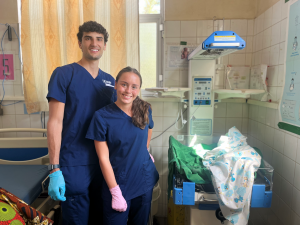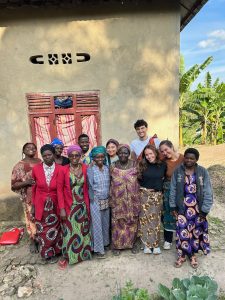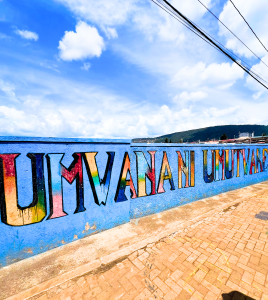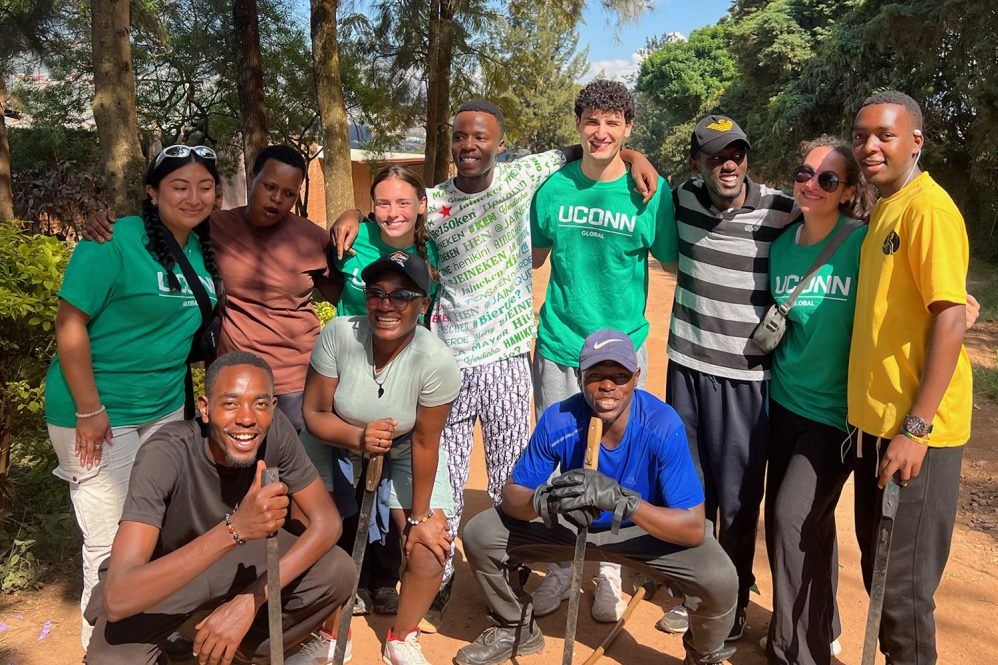On the very first day of clinical at the University Teaching Hospital of Kigali (CHUK) in Rwanda, seniors Gabriella Argenio ’24 (NUR) and Kaitlynn Brito Torres ’24 (NUR) had the immersive experience of participating in their first live birth. Together, they rolled up their sleeves and jumped right in.
“It was literally like a textbook, seeing life happen like that,” says Argenio.
She and Brito Torres walked the new mother through breathing exercises, squeezed her hand, brought her to the birthing chair, and witnessed the baby’s birth. Although there was a language barrier, the gratefulness in her eyes was palpable.
“It was an unforgettable experience that marked our journey into nursing and patient care. We feel incredibly fortunate to be a part of this meaningful experience. When we visited the mother the next day, she expressed gratitude for having us by her side throughout her labor and childbirth. It made me realize that every role in childbirth is significant, even if you are simply there to hold the mother’s hand and provide encouragement,” says Argenio.
Later, Emily Gorman ’24 (NUR) and Michael Fiorito ’24 (NUR) would also assist in not one, but two labor and deliveries within their first clinical hour.

“Seeing everyone rally around the mother as she endured such intense pain was incredibly rewarding. When the baby was finally born, the sense of relief and joy in the room was overwhelming. I felt deeply happy for both the mother and her newborn, and proud to have been part of such a profound and special moment,” says Fiorito.
These were just some of the many formative moments for the students during their time in Africa.
For Gorman, her inspiration to travel abroad came from a patient whom she cared for during her Fundamentals clinical rotation. His passion for teaching and developing schools around the world spurred her to want to study and learn abroad and create meaningful change wherever she goes. So, she wasted no time jumping on this incredible opportunity.
For similar reasons, Brito Torres can now confidently say she wants to practice nursing in a global setting. Fiorito knew this experience would bring him a fresh appreciation for the things often taken for granted at home, which proved to be true for every student in this program.
Argenio decided to take the spontaneous leap when she realized this was a rare opportunity to see the world that not everyone gets to experience in their nursing journey.
We learned how to give culturally competent care, always considering the context, like how females are highly valued for their role as child bearers. We were taught how to give compassionate and individualized care by honoring someone’s values and backgrounds. — Emily Gorman ’24 (NUR)
Theory and Nursing Practice for Perinatal and Women’s Health is a required six-credit academic course. The students completed a total of 90 clinical and laboratory hours in addition to theory and met all the course’s learning outcomes. This program was designed to give students experiential learning in the lab and simulation center prior to starting clinical.
The University of Rwanda and the University Teaching Hospital of Kigali were supportive in its establishment and collaboration.
How it All Began
In 2015, UConn School of Nursing alumna Pamela Meharry went to Kigali as part of her Human Resources Health Partnership, which included both clinical and didactic instruction.
Meharry previously served as faculty member with UConn’s School of Nursing’s program to South Africa. In Rwanda, she was leading a study abroad program for another university when she reached out to the School of Nursing’s former dean Deborah Chyun, who was part of the Rwanda Human Resources for Health (HRH) Program.

“The Rwanda Human Resources for Health Program [was] a 7-year health professional training initiative led by the Government of Rwanda with the goals of training a large, diverse, and competent health workforce and strengthening the capacity of academic institutions in Rwanda,” according to the Kerman University of Medical Sciences. “In the first 5 years of the HRH Program, a consortium of US academic institutions deployed an average of 99 visiting faculty per year to support 22 training programs. The HRH Program has also built capacity within the CMHS by promoting the recruitment of Rwandan faculty and the establishment of additional partnerships and collaborations with the US academic institutions.”
Dr. Chyun was instrumental in supporting the initial planning of the Rwanda opportunity for current UConn School of Nursing students. After 18 months of dedication to designing the program, Dr. Michelle Cole, director of global initiatives, and Meharry were integral parts of this initiative – which serves as an initial step to the overarching goal of building mutual capacity within the University of Rwanda and the School of Nursing to expand faculty and student partnerships.
For this most recent partnership, the School of Nursing’s Experiential Global Learning Program teamed with Global Engagement Institute (comprised of individuals already working within the country), who provide day-to-day support that the students need on the ground.
Both Meharry and Denyse Iradukunda, Rwandan GEI leader, went to great lengths to make the academic and social processes as smooth as they could and to introduce them to Rwandan culture. During their six-week course, Meharry instilled her passion for global and women’s health in an intimate and personalized teaching setting.
For Gorman, Meharry is a prime example of the impact one nurse can have on an entire community.
“Dr. Meharry was deeply committed to ensuring we made the most of our clinical experience, knowing how valuable each minute in the hospital was. Denyse went above and beyond to make us feel comfortable, even inviting us to her pre-wedding ceremony at her family’s home. Together, they took what was already a great experience and elevated it to something phenomenal, always putting our needs first, which I truly appreciated,” says Fiorito.
The locals welcomed the students with arms spread wide. Their openness, sincerity, and compassion shone through as they embraced each student.
Argenio shares that, “Every day from our apartments, we were able to indulge in the beautiful sights and lights coming up or down from Mount Kigali. We had many nights on our balconies admiring the weather and view.”
One of her fondest memories was waking up in the peaceful mornings, sipping on coffee on the porch, while the school next to their apartment sang and played drums.
Together, they celebrated and shared meals and moments of joy. On the last Saturday of the month, entire towns and villages come together for Umuganda, a day of community service.

“We connected with people of all ages outside the clinical setting and were greeted with open arms. The day was filled with playfulness, laughter, and dancing as we worked together to clean up the community. This national holiday was not just about tidying up, but a beautiful tradition that brought people together and highlighted Rwanda’s resilience and the significant progress towards healing after the genocide,” says Gorman.
The students also got to visit Lake Kivu, the Nyamirambo Women’s Center, Akagera National Park, and the Kigali Genocide Memorial. The students all expressed how their time at the Genocide Memorial was both harrowing yet encouraging. They learned about the wide-reaching effects of the 1994 genocide in Rwanda, and about the reconciliation efforts so integral to its culture.
“The education center, gardens, and Genocide Archive of Rwanda contribute to a meaningful tribute to those who perished and provide a powerful educational experience for visitors. [It provides] a national and international focal point for remembrance of the Genocide against the Tutsi; peace and values education programming for students, educators, and other professionals; documentation and preservation of survivor testimony and genocide artefacts and help for survivors who remain in need of support,” according to the Kigali Genocide Memorial Remembrance and Learning site.
The students witnessed firsthand the tremendous impact this event had on their patients, many of whom lost family and friends. This perspective made it all the more awe-inspiring to see how a community has come together as one big family with a collective focus on healing.
Lessons Learned
As part of this healing process, Argenio notes that the health care professionals at the teaching hospital frequently highlighted the importance of self-care for their workers and students, like resting, taking meals, and breaks. There was also a huge emphasis on teamwork. In the field, everyone gathered to help their patients across the ranks; they all had the same investment in the outcome. Argenio says this philosophy is not only extremely beneficial for patients, but for nurses as well.
Another unique and valuable lesson for the students was witnessing how these workers would use what they had with limited resources, from navigating the lack of air conditioning to using paper charts. When resources are limited, being able to think outside the box is crucial.
These [students] are telling us that this full and rich experience taught them humility, sensitivity, and awareness, and [they] are bringing it back here to the U.S. — which makes my heart warm. [They] learned a lot and will be spectacular nurses because of those qualities — Dr. Michelle Cole, UConn director of global initiatives
Brito Torres says this experience will be valuable in the United States when she gets into the workforce. Currently, she is an emergency department tech at her local hospital.
Some underserved communities with health disparities may not have access to the same level of care as others. However, Brito Torres says she is inspired by the work she sees every day by those who go above and beyond to care for their patients, use every resource available, and address social determinants of health head on.
“As a nurse, understanding what patients need medically is important, but so is helping them achieve their health goals through history and background,” she says.
Argenio, Gorman, and Brito Torres are participating in an independent study with Cole where they are examining what they learned, educating others on their experience, and further exploring nursing in different areas of the world.



